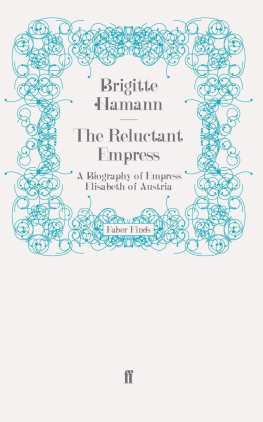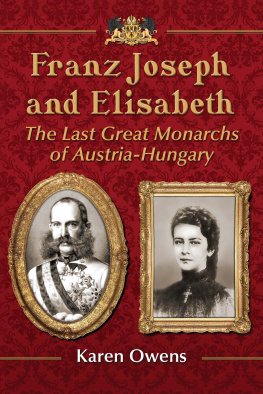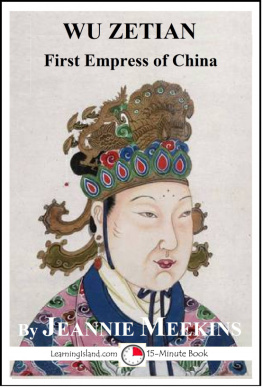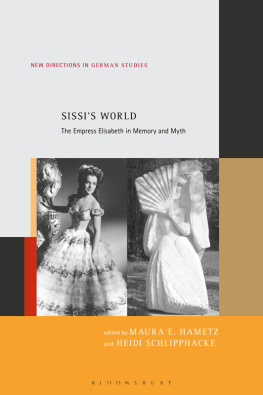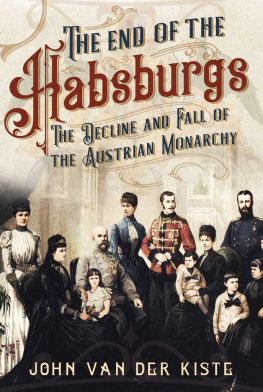THE RELUCTANT EMPRESS
A Biography of Empress Elisabeth of Austria
BRIGITTE HAMANN
TRANSLATED FROM THE GERMAN BY RUTH HEIN
CONTENTS
CHAPTER ONE
Engagement in Bad Ischl
CHAPTER TWO
Wedding in Vienna
CHAPTER THREE
The Newlyweds
CHAPTER FOUR
Flight
CHAPTER FIVE
The Cult of Beauty
CHAPTER SIX
Hungary
CHAPTER SEVEN
The Burdens of Public Appearance
CHAPTER EIGHT
The Queen Rides to Hounds
CHAPTER NINE
Titania, Queen of the Fairies
CHAPTER TEN
Eagle and Seagull
CHAPTER ELEVEN
Heines Disciple
CHAPTER TWELVE
Katharina Schratt, The Friend
CHAPTER THIRTEEN
Rudolf and Valerie
CHAPTER FOURTEEN
The Odyssey
PREFACE
T his book is the life story of a woman who refused to behave according to her rank. Drawing on remarkable self-confidence, she strove for and achieved the goal that it took the twentieth-century feminist movement to name self-realization.
She played none of the roles assigned to her by tradition and her surroundings: not the role of loving and devoted wife, not the role of mother, not the role of principal figurehead in a gigantic empire. She insisted on her rights as an individualand she prevailed. That her self-realization did not make her happy is the tragedy of her lifeaside from the tragedies that befell her most immediate family, set in motion by her refusal to be co-opted. Elisabeth, Empress of Austria, Queen of Hungary and Bohemia (to list only her most important titles), was at heart a republican, calling the venerable monarchy the skeleton of former splendor and an oak tree that was bound to fall, since it had outlived its usefulness (). She excoriated the excesses of the aristocratic system, and she flouted kings and princes, as she had learned to do from her revered model and master, Heinrich Heine.
Class consciousness was not in her nature, foreign to her to such a degree that in the end the Empress-Queen seemed an alien outsider at the court of Vienna, an irritant to the court society living by the traditional rules. This effect Elisabeth deliberately cultivated.
On the one hand, as a proponent of democratic ideals, Elisabeth represents an anomaly (even a curiosity); on the other, her example above all illustrates the power of the antimonarchist ideas current in the late nineteenth century. These ideas did not stop short of princes, who were beginning to question the legitimacy of their (inherited rather than earned) elite positions. The remark Count Alexander Hbner entered in his diary on November 18, 1884, was surely true: It is a fact that no one any longer believes in kings, and I do not know if they believe in themselves. And Elisabeths friend, the poet Carmen Sylva (Queen Elisabeth of Romania), expressed the same belief even more bluntly: The republican form of government is the only rational one; I can never understand the foolish people, the fact that they continue to tolerate us ().
This attitude gave rise to considerable conflicts in the area of class consciousness. For though the awareness of his individuality made the aristocrat who was touched by modern ideas willing to present himself as merely one among many equals (distinguished primarily by the middle-class virtues of accomplishment and culture), only too often he would have to recognize that he could not hold his own in the competition (at least not to an extent due his noble origins)that his individual worth did not, therefore, coincide with his special social standing; these nobles understood that in the last resort they would leave nothing behind but a title they had not earned and a function whose value they did not acknowledge. This was the tragedy of Empress Elisabeth, as it was of her son, Rudolf.
Elisabeths life is full of grim, even desperate efforts to gain recognition as an individual. Her first and most successful struggle was to be beautiful. The legendary beauty of Empress Elisabeth was in no way merely a gift of nature; it was also the result of rigorous self-control and lifelong discipline, which in the end became physical torment. In similar fashion she earned her reputation as an outstanding sportswoman, the top woman rider in hunts all over Europe during the 1870s. This was a form of fame that, like the fame of her beauty, could not but wane with increasing age, in spite of all her self-discipline. Her highest hopes for wresting renown from posterity lay in another direction: she would be known as an inspired poet. The evidence of her effortspoems, hitherto unknown, covering more than five hundred pages, all written in the 1880sforms the basis of the present study. These lines provide Elisabeths most intimate and personal statements about herself, about the world around her, and about her times. But they also clearly show her failure; for the poems in no way justify Elisabeths hope for posthumous fame. The lines are interesting not for their literary worth (the dilettantism of the Heine imitation is hard to ignore or gloss over); rather, as the work of an empress and queen, they furnish us with source material for the history of the Habsburg monarchy as well as the intellectual history of an enlightened aristocrat, a cultured woman of the nineteenth century. Finally, Elisabeths poetry serves to illustrate the nervous century, with an emotional life often transcending the limits of reality.
I am deeply grateful to the Swiss federal government and the directors of the Swiss Federal Archives in Bern for granting me permission for the first perusal of these sources, which were kept under strictest secrecy until now. Our friend Dr. Prof. Jean-Rudolf von Salis graciously used his good offices to secure this permission. The circumstance that the Empress entrusted what she believed to be her most valuable possession, her literary bequest, to a republic (though the one she considered the prototype and ideal) best characterizes her attitude to the Austro-Hungarian monarchy as well as to the House of Habsburg.
Besides the Empresss literary estate, I worked through still other new sources, such as the documents referring to Elisabeth in the archives of Archduke Albrecht (Hungarian State Archives, Budapest); Privy Councillor Baron Adolf von Braun (Imperial Haus-, Hof- und Staatsarchiv, Vienna); the Imperial Adjutant General Count Karl Grnne (in private hands).
Additional sources include the diaries of Archduchess Sophie (with kind permission of Dr. Otto von Habsburg) and of Prince Karl Khevenhller (with kind permission of Prince Max von Khevenhller-Metsch).
I am also indebted to the estate of the archivist and historian Richard Sexau of Munich for a vast amount of new material. Sexau made detailed and reliable copies of sources in private hands which were unfortunately not available to me in the original. The most valuable among these are the diary of the Emperors younger daughter, Archduchess Marie Valerie, and the diary of Elisabeths niece, Duchess Amlie von Urach, as well as the extensive correspondence of the Empresss mother, mother-in-law, and aunts to and from each other.
Valuable notes on conversations with Countess Marie Festetics, one of Elisabeths ladies-in-waiting, were made available to me in the papers of the historian Heinrich Friedjung (State Library, Vienna, Manuscript Division).
I found several though widely scattered source copies (especially of Elisabeths letters to her husband, to her daughter Marie Valerie, and to her mother, Duchess Ludovika) among the papers of Egon Caesar Conte Corti (Haus-, Hof- und Staatsarchiv, Vienna). However, whenever I worked with sources earlier cited by Corti, I made use of the originals. Without exception, my opinion of what passages were worth quoting differed from Cortisthough I do not mean even by implication to diminish his merits in interpreting primary sources. It is precisely to this renewed perusal of the following original sources that I owe many new insights: diary of Countess Marie Festetics (Szchenyi Library, Budapest); diary of Count Alexander Hbner (Historical Institute of the University of Padua); estate of the Imperial Adjutant General Count Franz Folliot de Crenneville (Haus-, Hof- und Staatsarchiv, Vienna); estate of Landgravine Therese Frstenberg (Frstenberg Family Archives, Veitra, with kind permission of Prince and Landgrave Johannes von und zu Frstenberg).

